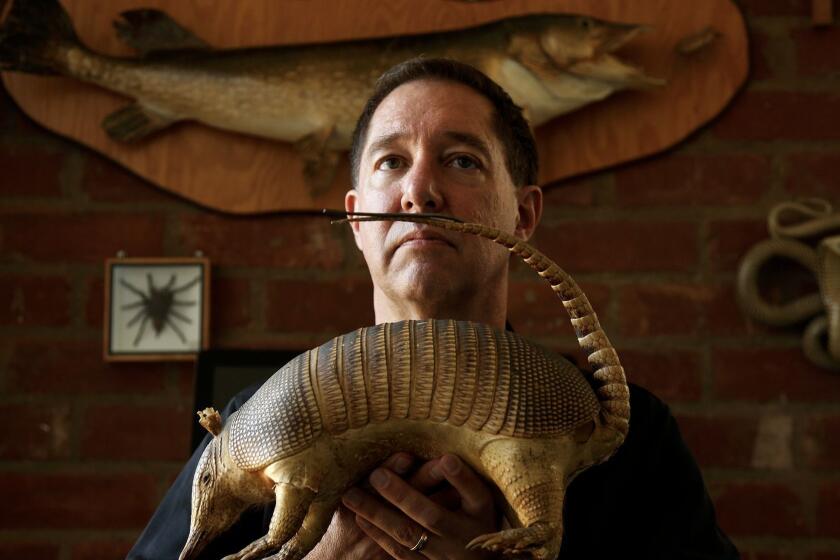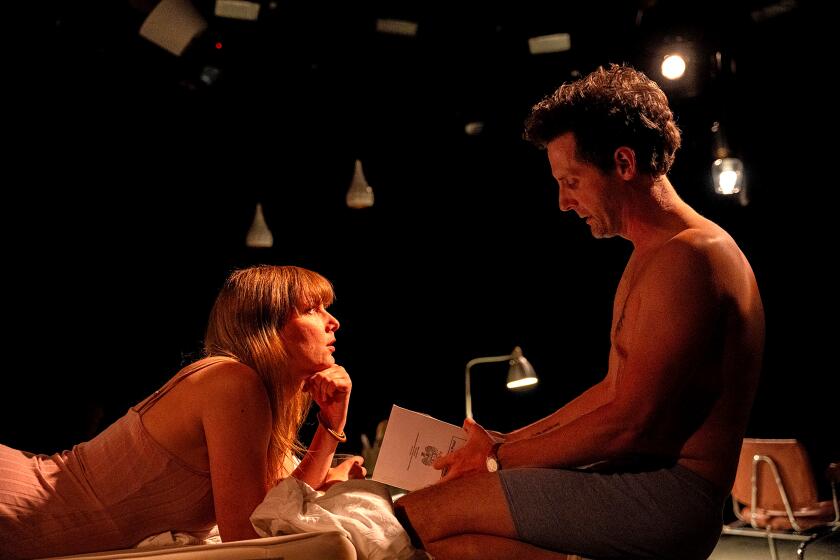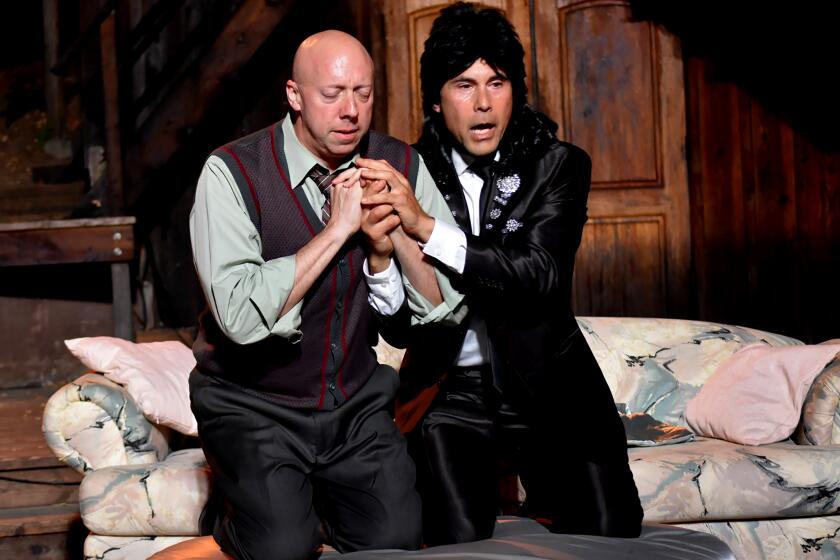Two ambitious plays by Tom Jacobson on rise of Nazism are unsettling in their timeliness

- Share via
The temptation for a writer following in Shakespeare’s history-play footsteps is to let history do the talking. But this is an abdication of responsibility. History supplies events, presents larger-than-life figures and provides plenty of endings, tragic and otherwise. But plots — the way events are organized around the actions and reactions of characters — are how playwrights create new meaning from old tales.
Tom Jacobson, a prolific local playwright who has been a mainstay of Los Angeles’ intimate theater scene, has written two new plays centering on 20th century European artists during the traumatic rise of Nazism and antisemitism in prewar Germany. But the playwright relies too heavily on the historical interest of the material: So busy chronicling what happened, he loses sight of his main task, creating autonomous dramas.
Churchgoer. Gymgoer. Fundraising executive. Devoted spouse, son and colleague.
“Crevasse,” the better of the two plays, now having its world premiere at the Victory Theatre Center, revolves around German filmmaker Leni Riefenstahl, who became a darling of Hitler’s and one of his most prominent enablers. In her documentaries “Triumph of the Will” and “Olympia,” Riefenstahl helped shape the Führer‘s public image by bringing breakthrough aesthetic techniques to Nazi iconography and propaganda.
“The Bauhaus Project,” a two-part epic playing in repertory at Atwater Village Theatre, revisits the tumultuous history of the Bauhaus School, which sought to integrate the arts and technical craftsmanship in a modernist utopia. The mission: to raise the quality of living both practically and spiritually through objects that balanced beauty and utility. The world, unfortunately, had other plans.
With World War II and the Holocaust looming on the horizon, both plays examine the survival strategies — defensive in the case of many of the leading Bauhaus figures, self-serving in the case of Riefenstahl — of artists confronting the juggernaut of history.
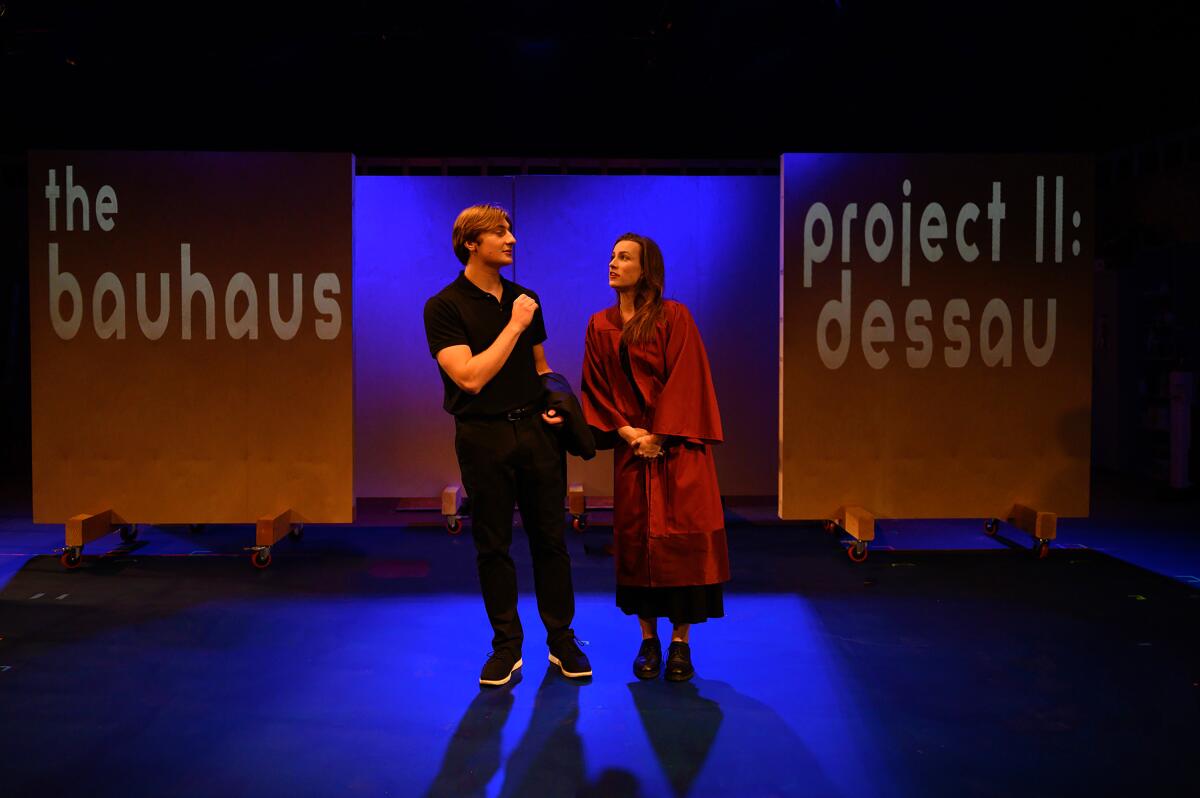
“The Bauhaus Project,” now making its world premiere in an Open Fist Theatre Company production directed by Martha Demson, surveys its subject like an introductory seminar. The play might as well be organized as a series of PowerPoint presentations. The classroom ambience is intentional.
Jacobson sets up a problematic frame. Students at a Southern California art school have enrolled in a class on the Bauhaus. Facing expulsion for a variety of highly contrived reasons, these difficult-to-corral undergraduates, each studying a different artistic discipline, are required to participate in a play on a chapter of art history that most don’t see the point of studying.
Jacobson lightly satirizes the attitudes, ranging from woke to just plain lazy. “History is boring!” complains one student. “What’s a 100-year-old German art school got to do with anything?” Others argue more explicitly against the Eurocentric nature of the curriculum.
Alone among his fellow students, Owen (Jack Goldwait) is passionate about all things Bauhaus and does his best to coax his classmates into researching, writing and performing a work on their findings. I hesitate to call what follows a play.
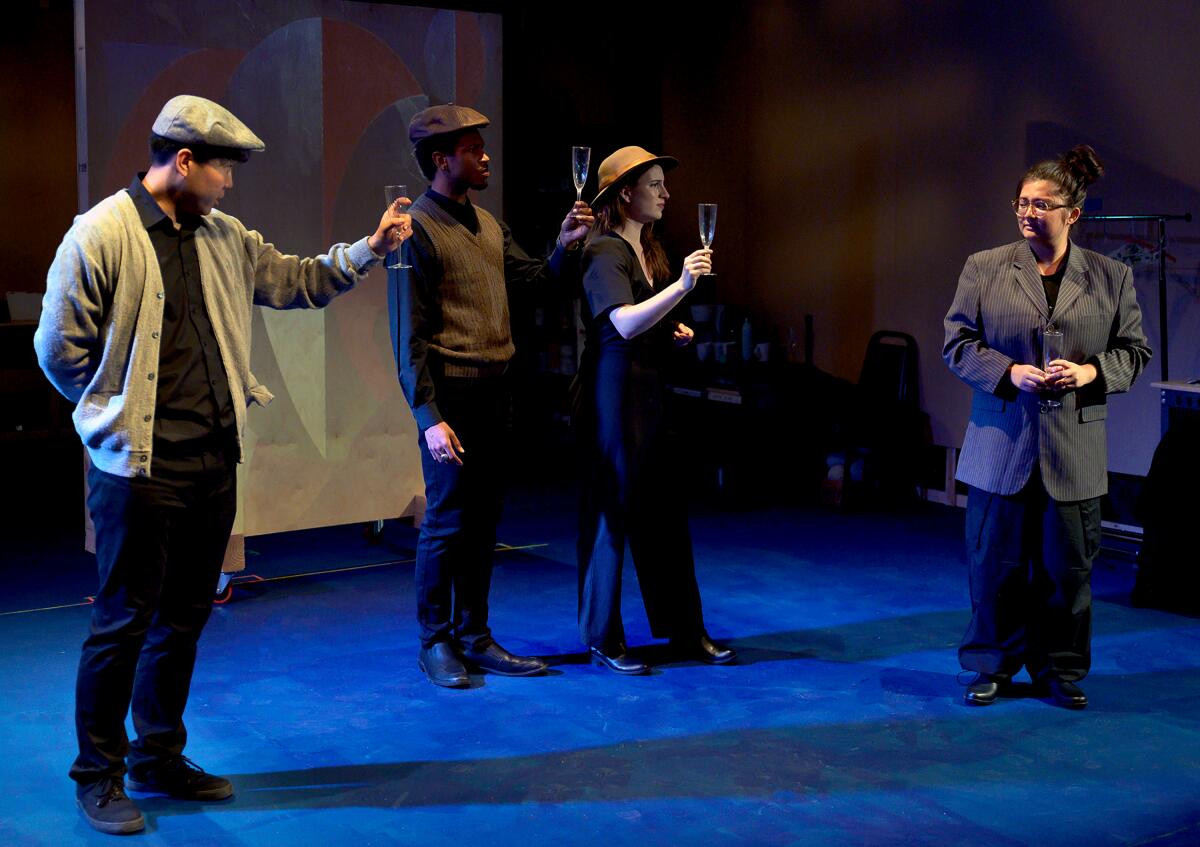
There is little in the way of character or plot development. A good deal of the acting of the students within the play recalls the Rude Mechanicals in “A Midsummer Night’s Dream” bumbling through the tale of Pyramus and Thisbe. Suffice it to say the conceit of an amateur drama is a risky strategy for such a sprawling work.
Jacobson divides “Bauhaus” into three sections. Part 1 concentrates on the Weimar years (1919-25). Part 2 is largely devoted to the Dessau era (1925-32), but after intermission the play proceeds to the Berlin period (1932-33) — a coda that marks the end of the German school as the Nazi grip on power murderously tightens.
Goldwait, the standout in the cast, plays Walter Gropius, the German architect who became the founding director of the Bauhaus. He is a dashing guide through this bygone world, with all its ferocious artistic squabbles and deadly geopolitical strife. Goldwait’s absence is sorely felt when the school’s leadership changes, though the actor’s flickering return as an impish, bow-tie-wearing Paul Klee, the Swiss-German painter, offers slight compensation.
Chloe Madriaga, the most emotionally affecting ensemble member, is tasked with bringing to life (among other parts) the role of architect and furniture designer Ludwig Mies van der Rohe, the Bauhaus’ last director, whose entrepreneurial and determinedly apolitical spirit struggles to keep the institutional dream of Bauhaus alive. There is no escape from politics, Mies reluctantly comes to understand. Everyone must eventually pick a side. It’s a lesson other Bauhaus luminaries grasped sooner, but the dream of being a free artist is hard to relinquish.
Romance goes afoul in Abby Rosebrock’s ‘Dido of Idaho’ at Echo Theater Company as offbeat comedy takes a brutal turn.
The number of characters makes it hard enough for the play to gain dramatic traction. But with each actor playing multiple roles, the situation grows dizzying. The low-key antisemitism of Wassily Kandinsky (Sang Kim) could be the basis for its own play, but all we’re given are passing glimpses of how the Russian painter simultaneously flaunts and denies his hateful views.
John C. Sweet portrays with a muted sadness Arnold Schönberg, the groundbreaking Jewish composer and music theorist, who is forced to cut off his friendship with the antisemitic Kandinsky. More Schönberg in the play would not have gone amiss. But Sweet’s other roles (including painter and designer Johannes Itten and painter and playwright Oskar Schlemmer) barely have space to emerge from the abstraction of historical summary.
Katarina Joy Lopez takes on the most self-dramatizing of the characters, Austrian composer and author Alma Mahler, Gustav Mahler’s former wife who later married Gropius in a tortured, ill-fated union. Lopez is more reserved in her portrayal of German textile designer Maria Kipp. But the unhinged energy she brings to Ellis, the California art school student who complained about the tediousness of history and shocked the other students by her eagerness to don a Nazi uniform, bleeds into her other roles.
I appreciated Jacobson’s overview of the Bauhaus, but I would have preferred to hear him lecture on the topic. What is missing in this two-part play is a perspective potent enough to open a dramatic pathway. I kept imagining what playwright Tom Stoppard would do with this constellation of artists divided by a common utopian vision as their world goes up in flames. It’s safe to say that, in addition to being a good deal more flamboyantly witty, the play would transcend the known record.
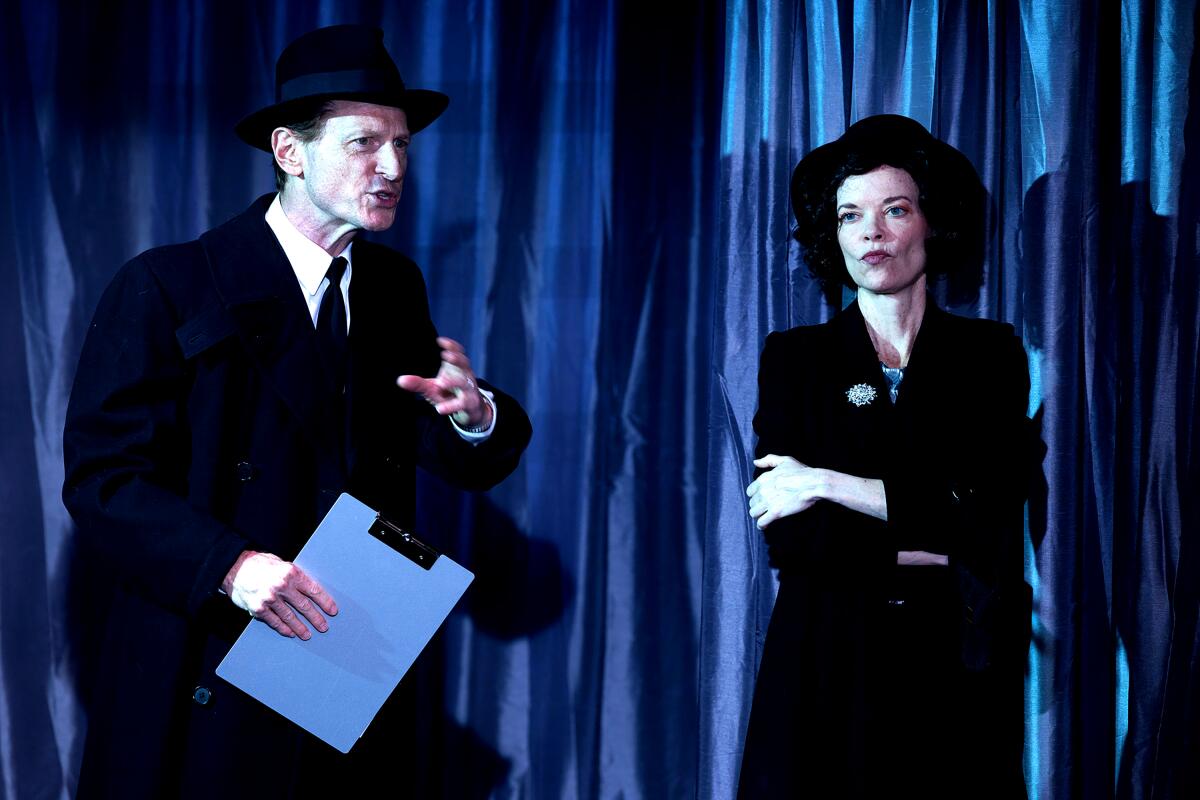
“Crevasse,” by contrast, is extremely well-acted, directed and designed. It’s also a good deal tighter in structure. A co-production of Son of Semele and the Victory Theatre Center, the drama is staged with spectacular imagination by Semele artistic director Matthew McCray.
A two-hander expertly performed by Leo Marks and Ann Noble, the piece concentrates on the encounter between Riefenstahl and Walt Disney, when the German filmmaker traveled to America to find a distributor for “Olympia,” her documentary about the Berlin 1936 Summer Olympics. A work of Nazi propaganda, the film was also a dazzling work of art that captured the majesty of African American track and field star Jesse Owens, who won four gold medals at these Games.
Riefenstahl’s hopes of ginning up American interest in her movie are dashed by Kristallnacht, the horrific pogrom that occurred in November 1938. As the news broke, Hollywood moguls refused to have anything to do with this Nazi apologist. Disney is the only powerful American producer who agrees to see her, and Jacobson treats the exchange like a dance between two morally slippery artists.
The setup of the play, which begins in Germany, suggests a theatrical hall of mirrors. Marks plays Ernst Jaeger, a film critic and editor with a Jewish wife, Lotte (Noble), and son. Ernst is urged by his wife to curry favor with Riefenstahl to put himself in a better position with the Nazi authorities. Lotte and Ernst rehearse what he’ll say to Riefenstahl, but the rehearsal instantly (if hazily) becomes the actual meeting, which leads to Ernst serving as Riefenstahl’s press agent on her American tour.
After Ernst arranges the meeting with Disney, Marks pencils in a toothbrush mustache and transforms himself into a creepily avuncular version of the character, whose Midwestern niceness becomes menacing when his business interests are threatened.
Freyda Thomas adapts Moliere’s ‘Tartuffe’ with an American twist in a winning production at Topanga’s beloved Will Geer Theatricum Botanicum.
It’s a remarkable performance, and Noble’s volatile Riefenstahl, as grandiose and bellicose as she is seductive and meek, is every bit as vividly conceived. But I found it hard to track Jacobson’s reason for revisiting a story that had been more efficiently covered in Colin Shindler’s BBC audio docudrama “Leni Goes to Hollywood.”
As Disney takes Riefenstahl on an elaborate tour of his studio, the play settles into a cat-and-mouse game, with each character taking turns as prey and predator. The career stakes are huge for Riefenstahl but less so for American audiences in the 21st century, who know that Nazi Germany is on an inexorable path to war.
Confounding matters is the short shrift that’s given to Ernst’s personal story. After his wife and son are abducted in the tumultuous wake of Kristallnacht, Ernst decides to stay with Riefenstahl in the hope that she will intervene on their behalf. But the way in which he gives his loved ones up for dead is either an acceptance of futility or a compromise of conscience even more chilling than Riefenstahl’s Faustian pact with Hitler.
Unfortunately, Jacobson deals with the matter as a perfunctory bookend. He lavishes attention on the more culturally salient story of Riefenstahl but muddles its significance in a playful, morally uncommitted approach that perhaps might be more satisfying with supplemental biographical material. A play, however, must be self-contained.
“The Bauhaus Project” and “Crevasse” are thrilling in the scope of their ambition. They are also unsettling in their timeliness as America faces its own fascist peril. A series of satellite events, under the banner Reflections on Art and Democracy, is taking place throughout the summer at ArtCenter College of Design, Skirball Cultural Center and other institutions to help think through the historical parallels.
“Crevasse” is worth seeing for the first-rate production. But a good essay on the Bauhaus, which has had such a flourishing afterlife in L.A. and around the world, might be preferable to this well-intentioned yet under-imagined drama on an art school that wasn’t fated to survive but lives on in its enduring aesthetic and educational ideal.
‘The Bauhaus Project,’ Part 1 and Part 2
Where: Atwater Village Theatre, 3269 Casitas Ave., L.A.
When: Part 1: Fridays at 8 p.m. and Saturdays at 4 p.m.; Part 2: Saturdays at 8 p.m. and Sundays at 4 p.m. Ends Aug. 25.
Tickets: $50 combination ticket (for Part 1 and Part 2), $35 for individual ticket
Info: openfist.org or (323) 882-6912
Running time: Part 1: 1 hour, 45 minutes; Part 2: 2 hours, 10 minutes
‘Crevasse’
Where: The Victory Theatre Center, 3326 W. Victory Blvd., Burbank
When: 8 p.m. Fridays and Saturdays, 4 p.m. Sundays. Ends Aug. 18.
Tickets: $32–$40
Info: thevictorytheatrecenter.org or (818) 841-5421
Running time: 1 hour, 35 minutes
More to Read
The biggest entertainment stories
Get our big stories about Hollywood, film, television, music, arts, culture and more right in your inbox as soon as they publish.
You may occasionally receive promotional content from the Los Angeles Times.
